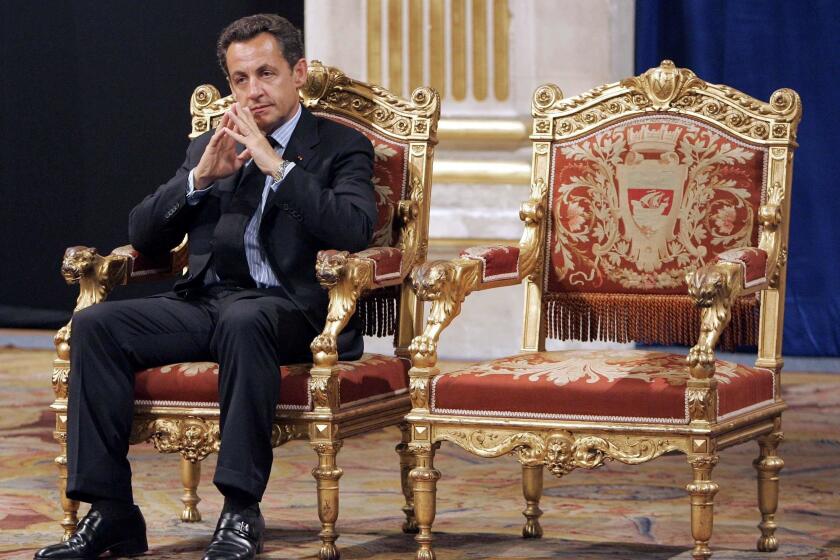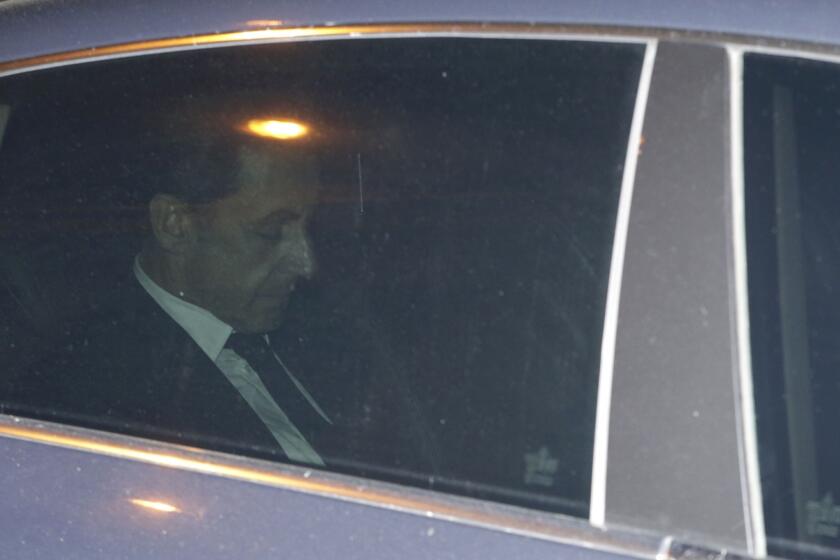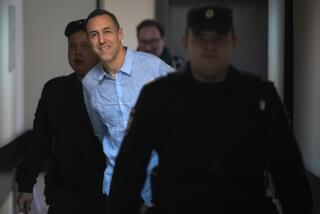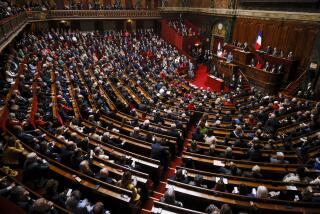France’s highest court upholds corruption conviction of former President Nicolas Sarkozy

- Share via
PARIS — France’s highest court has upheld an appellate court decision that had found former President Nicolas Sarkozy guilty of corruption and influence peddling while he was the country’s head of state.
Sarkozy, 69, faces a year in prison, but is expected to ask to be detained at home with an electronic bracelet — as is the case for any sentence of two years or less.
He was found guilty of corruption and influence peddling by both a Paris court in 2021 and an appeals court in 2023 for trying to bribe a magistrate in exchange for information about a legal case in which he was implicated.
“The convictions and sentences are therefore final,” a Court of Cassation statement on Wednesday said.
Sarkozy, who was France’s president from 2007 to 2012, retired from public life in 2017 though he still plays an influential role in French conservative politics. He was among the guests who attended the reopening of Notre Dame Cathedral earlier this month.
Former French President Nicolas Sarkozy has been found guilty in a landmark corruption and influence-peddling trial and sentenced to a year in prison.
Sarkozy, in a statement posted on X, said, “I will assume my responsibilities and face all the consequences.”
He added: “I have no intention of complaining. But I am not prepared to accept the profound injustice done to me.”
Sarkozy said he will seek to bring the case to the European Court of Human Rights, and hopes those proceedings will result in “France being condemned.”
He reiterated his “full innocence.”
“My determination is total in this case as in all others,” he concluded.
Sarkozy’s lawyer, Patrice Spinosi, said his client “will comply” with the ruling. This means the former president will have to wear an electronic bracelet, Spinosi said.
The trial of former French President Nicolas Sarkozy has concluded in Paris, after a month during which the court sought to determine whether he broke laws on campaign financing in his unsuccessful 2012 reelection bid.
It is the first time in France’s modern history that a former president has been convicted and sentenced to a prison term for actions during his term.
Sarkozy’s predecessor, Jacques Chirac, was found guilty in 2011 of misuse of public money during his time as Paris mayor and was given a two-year suspended prison sentence.
Sarkozy has been involved in several other legal cases. He has denied any wrongdoing.
He faces another trial next month in Paris over accusations he took millions of dollars from then-Libyan dictator Moammar Qaddafi to illegally finance his successful 2007 campaign.
The corruption case that led to Wednesday’s ruling focused on phone conversations that took place in February 2014.
PARIS — Former President Nicolas Sarkozy lashed out at French magistrates Wednesday for pursuing “grotesque” corruption charges against him, accusing the officials who put him under investigation of being politically biased and seeking to humiliate and destroy him.
At the time, investigative judges had launched an inquiry into the financing of Sarkozy’s 2007 presidential campaign. During the inquiry, they discovered that Sarkozy and his lawyer, Thierry Herzog, were communicating via secret mobile phones registered to the alias “Paul Bismuth.”
Wiretapped conversations on those phones led prosecutors to suspect Sarkozy and Herzog of promising magistrate Gilbert Azibert a job in Monaco in exchange for leaking information about another legal case involving Sarkozy. Azibert never got the post and legal proceedings against Sarkozy have been dropped in the case he was seeking information about.
Prosecutors had concluded, however, that the proposal still constitutes corruption under French law, even if the promise wasn’t fulfilled. Sarkozy vigorously denied any malicious intention in his offer to help Azibert.
Azibert and Herzog have also been found guilty in the case.
Corbet writes for the Associated Press.
More to Read
Sign up for Essential California
The most important California stories and recommendations in your inbox every morning.
You may occasionally receive promotional content from the Los Angeles Times.













